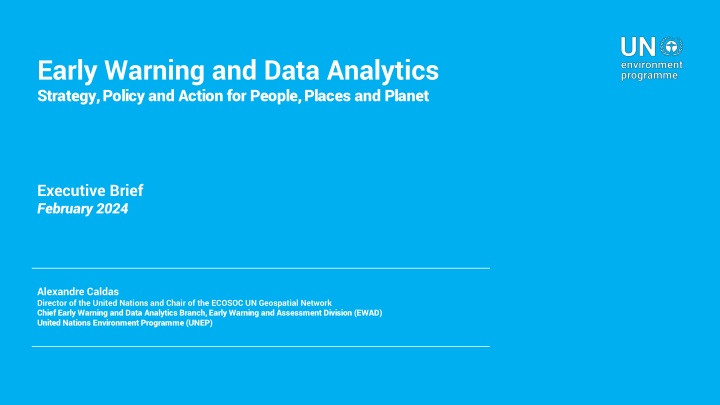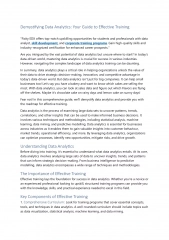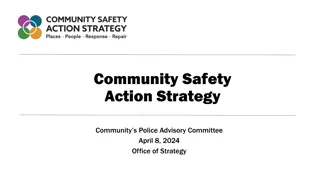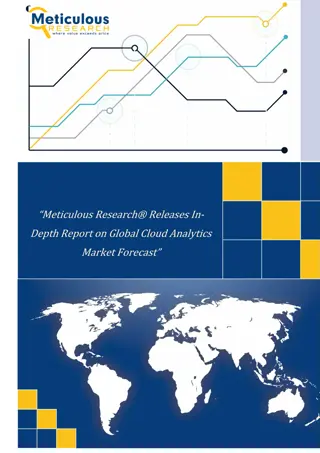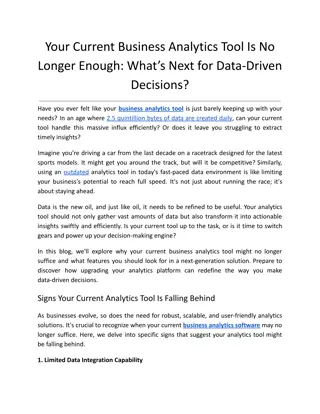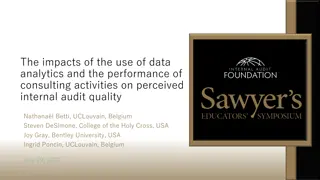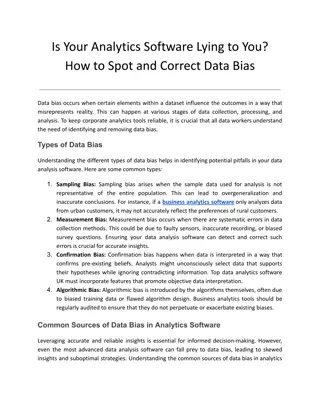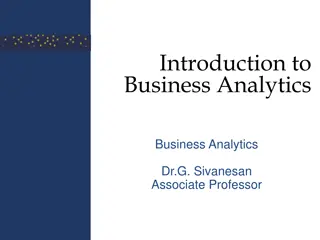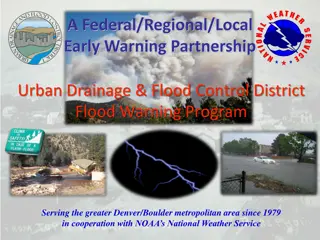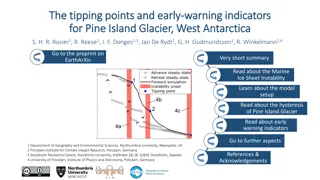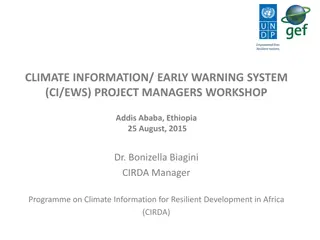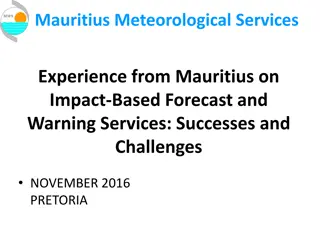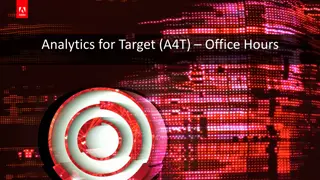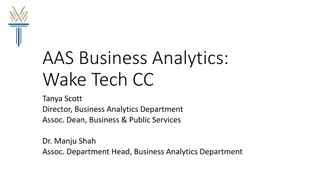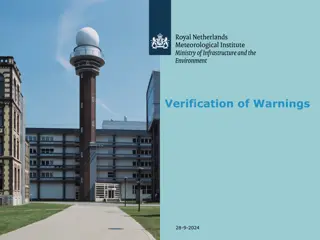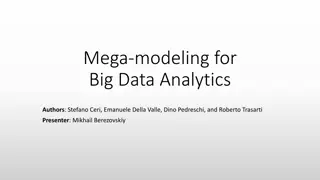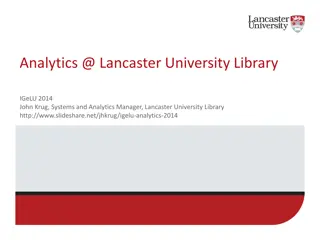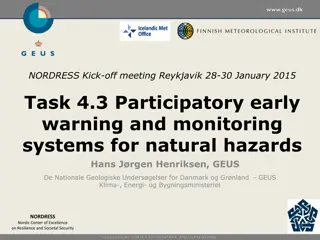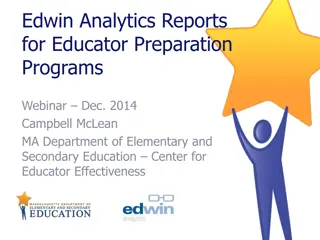Early Warning and Data Analytics Strategy, Policy and Action for People, Places and Planet
Explore the innovative Early Warning and Data Analytics Strategy introduced by the UN, focusing on leveraging early warning systems (EWS) to prepare for and manage hazardous climate-related events. This strategy aims to save lives, protect economies, and enhance sustainability by identifying, monitoring, and analyzing both rapid onset multi-hazards and slow onset continuous hazards. By leaving no one behind and emphasizing preparedness, response, and resilience, this approach addresses the complex challenges of today's uncertain environmental future.
Download Presentation

Please find below an Image/Link to download the presentation.
The content on the website is provided AS IS for your information and personal use only. It may not be sold, licensed, or shared on other websites without obtaining consent from the author.If you encounter any issues during the download, it is possible that the publisher has removed the file from their server.
You are allowed to download the files provided on this website for personal or commercial use, subject to the condition that they are used lawfully. All files are the property of their respective owners.
The content on the website is provided AS IS for your information and personal use only. It may not be sold, licensed, or shared on other websites without obtaining consent from the author.
E N D
Presentation Transcript
Early Warning and Data Analytics Strategy, Policy and Action for People, Places and Planet Executive Brief February 2024 Alexandre Caldas Director of the United Nations and Chair of the ECOSOC UN Geospatial Network Chief Early Warning and Data Analytics Branch, Early Warning and Assessment Division (EWAD) United Nations Environment Programme (UNEP)
Early Warning and Data Analytics Services https://wedocs.unep.org/20.500.11822/44794 https://wedocs.unep.org/20.500.11822/44792 https://wedocs.unep.org/20.500.11822/44791 https://wedocs.unep.org/20.500.11822/44790 https://wedocs.unep.org/20.500.11822/44793 https://wedocs.unep.org/20.500.11822/44789
Early Warning for Environment A complex, uncertain and unstable Future for People, Places and Planet
Early Warning & Data Analytics for People, Places and Planet Early warning systems (EWS) are an adaptive measure for climate change, using integrated monitoring, forecasting and communication systems to help communities prepare for and manage hazardous climate- related events. A successful EWS saves lives and jobs, land and infrastructure and supports long-term sustainability and disaster risk reduction. Early warning systems assist public officials and administrators in their planning, saving money in the long run and protecting economies and natural assets. The UN, working in diverse partnerships, has introduced a number of innovative EWS initiatives in vulnerable areas around the world. Early Warning for Environment Identifying, monitoring and analysing both rapid onset multi-hazards (with a predominant focus on climate-related risks) and slow onset but continuous hazards and their interlinkages, or issuing warnings of future events that come early enough for one to prepare, respond and Build Back Better. Leaving No One Behind. Saving the Lives of billions of People and preventing social and economic losses, protecting the property and natural assets of the most vulnerable communities in the world.
Early Warning & Data Analytics for People, Places and Planet Early warning systems (EWS) are an adaptive measure for climate change, using integrated monitoring, forecasting and communication systems to help communities prepare for and manage hazardous climate-related events. A successful EWS saves lives and jobs, land and infrastructure and supports long- term sustainability and disaster risk reduction. Early warning systems assist public officials and administrators in their planning, saving money in the long run and protecting economies and natural assets. The UN, working in diverse partnerships, has introduced a number of innovative EWS initiatives in vulnerable areas around the world. Early Warning for Environment Identifying, monitoring and analysing both rapid onset multi- hazards (with a predominant focus on climate-related risks) and slow onset but continuous hazards and their interlinkages, or issuing warnings of future events that come early enough for one to prepare, respond and Build Back Better. Leaving No One Behind. Saving the Lives of billions of People and preventing socio economic losses, protecting the property of the most vulnerable communities in the world.
Early Warning for Environment: towards a definition Early warning systems (EWS) are an adaptive measure for climate change, using integrated monitoring, forecasting and communication systems to help communities prepare for and manage hazardous climate-related events. A successful EWS saves lives and jobs, land and infrastructure and supports long-term sustainability and disaster risk reduction. Early warning systems assist public officials and administrators in their planning, saving money in the long run and protecting economies and natural assets. The UN, working in diverse partnerships, has introduced a number of innovative EWS initiatives in vulnerable areas around the world. Early Warning for Environment Identifying, monitoring and analysing both rapid onset multi-hazards and slow onset but continuous hazards and their interlinkages, or issuing warnings of future environmental events that come early enough for one to prepare, respond and Build Back Better. Leaving No One Behind. Build a multi-stakeholder approach and on the rich mandates of the Partner Agencies from the UN system and beyond to impact in countries, saving lives and property, particularly with the developing nations and the most vulnerable communities.
Early Warning for Environment Strategic Positioning We all know the importance of early warnings for climate change and related disasters. Early warnings can enhance resilience and adaptive capacity and reduce future loss and damage. Early warnings can save lives, livelihoods and nature s services. They protect assets that are worth far more than the costs of the systems themselves. They work. Through our Climate Information and Early Warning Systems (CIEWS) portfolio, UNEP helps countries across the world to increase access to high-quality weather and climate data, forecasting, and multi-hazard early warning systems that underpin evidence-based policy and early action. UNEP is proud to be part of the UN s Early Warnings for All initiative (EW4All), including as a founding partner and implementer of the Systematic Observations Financing Facility a partnership between WMO, UNDP and UNEP. But while extreme weather and climate change-induced disasters are often the most dramatic and obvious events, they are not the only ones we need to predict, prepare for and head off where possible. Alongside climate change, nature and biodiversity loss, and pollution and waste complete the triple planetary crisis.
Early Warning for Environment Strategic Positioning UNEP is already looking further into the future to predict signals of change. But we must do more. This is why you are now tasked with building a strategy for a new dimension to EW4All Early Warning for Environment. Nature loss and pollution are often more slow-onset and less visible than climate change, but no less damaging to lives and livelihoods. Air pollution and land degradation are perfect examples. Millions of people die around the world each year from air pollution, while billions of people are affected by land degradation. We also must consider issues like pollinator loss, zoonotic spillover, the erosion of natural barriers to floods and landslides, and more. This dimension will require a systematic approach to tracking the sources of pollution and waste and the drivers of nature and biodiversity loss. It will require the cooperation of all relevant agencies and Multilateral Environmental Agreements (MEAs) including the Kunming-Montreal Global Biodiversity Framework, the new Global Framework on Chemicals and the upcoming deal on plastic pollution. Each agency and MEA must be a contributor and beneficiary and support the UN Common Approaches to biodiversity and pollution with a view to boosting the achievement of the Sustainable Development Goals.
UNEPs Strategic Goal and Priorities Early Warning and Data Analytics Strengthen the environmental dimension of Early Warning towards acceleration of the achievement of Agenda 2030 and the Sustainable Development Goals (SDGs) Increase the Impact in Countries 30 focus countries in EW4All 25+ countries with CIEWS investments 60 CCA Countries One Planet EW Global, Regional and National Platform Accelerate the achievement of the SDGs Geospatial and Statistics integration and Leadership at UN level Capacity Development on SDGs and Early Warning for Environment Synergies on the Nexus (Development, Peace and Humanitarian) Provision of Disaggregated Data Analytics to countries Ensure UNEP Leadership in Early Warning for Environment UNEP leadership on the environmental dimension of EW4ALL Leadership on Geospatial Early Warning Leadership on Statistics for Early Warning and SDGs
UNEPs Data Analytics Service Portfolio Data Analytics is used for the discovery, interpretation, and communication of meaningful patterns in data towards effective decision making. 01 01 Early Warning and Early Warning and Data Analytics Data Analytics Data Analytics is rated as highly relevant by 82% of the countries for the UN Sustainable Development Cooperation Framework. 02 02 Data Analytics: is the systematic computational analysis of data or statistics. Five main types are descriptive, diagnostic, prescriptive, predictive and Cognitive, including artificial intelligence. Geospatial, Statistics and Data Analytics: are fundamental Accelerators for the Achievement of Global Agendas as Agenda 2030 and the Sustainable Development Goals.
UNEPs Climate Information and Early Warning Systems (CIEWS) Portfolio Establishing, upscaling and strengthening end-to-end Climate Information Services and Multi-Hazard Early Warning Systems (MHEWS) to enhance resilience and adaptive capacity helping to save lives, livelihoods and ecosystems in the face of climate-related hazards. Core components of UNEP s CIEWS initiatives: Strengthening institutional frameworks for climate information and MHEWS Early Warning and Early Warning and Data Analytics Data Analytics Enhancing capacity for monitoring, analysis and forecasting of climate and its impacts Improving dissemination and communication of risk information and early warnings Enhancing climate risk management capabilities UNEP is also a co-founder and implementing entity of the Systematic Observations Financing Facility (SOFF)which supports the most vulnerable countries to close critical weather and climate data gaps that underpin better weather forecasts, early warning systems, and climate information services.
An Integrated Framework of Services Identifying, monitoring and analysing both rapid onset multi-hazards and slow-onset but continuous hazards and their interlinkages or issuing warnings of future events that come early enough for one to prepare, respond and Build Back Better. Leaving No One Behind.
An Integrated Framework of Services Identifying, monitoring and analysing both rapid onset multi-hazards and slow-onset but continuous hazards and their interlinkages or issuing warnings of future events that come early enough for one to prepare, respond and Build Back Better. Leaving No One Behind. 02 02 Scientific Assessment Scientific Assessment Branch Branch
An Integrated Framework of Services 02 02 Scientific Assessment Scientific Assessment Branch Branch
Why Early Warning for Environment? 2. Humanity has been facing multiple interlinked (SYSTEMIC) environmental, social, economic and health challenges Including the TRIPLE PLANETARY CRISIS: the climate change crisis, pollution, biodiversity loss and the extinction of species, deforestation, land degradation, increased incidents of environmental disasters, widening gaps between rich and poor, backlash to women s rights, lack of decent jobs and new emerging zoonotic diseases. The complexity and difficulties of addressing these challenges are compounded by the urgent need for action and the current fragility of the global economy. 1. There is a need for strengthened environmental governance at all levels. The planetary crises of climate change, pollution, nature and biodiversity loss can only be tackled successfully if they become a top policy Priority and Action supported by legislation, inclusive decision-making, monitoring, and enforcement.
Triple Planetary Crisis Climate Change, Biodiversity Loss and Pollution Lead us out of this mess , SG urged delegates at the Swedish summit convened by the UN General Assembly, in a call for action against a triple planetary crisis that s been caused by the climate emergency that is killing and displacing ever more people each year biodiversity loss which threatens more than three billion people and pollution and waste, that is costing some nine million lives a year . All Nations should do more to protect the basic human right to a clean, healthy environment for everyone, UN SG Mr. Guterres insisted, focusing in particular on poor communities, women and girls, indigenous peoples and the generations to come . By UN SG
Aligned with UNEP Mid Term Strategy and Agenda 2030 UNEP Medium-Term Strategy 2022-2025: on the road to 2030
One UN Common Approach for Early Warning for Environment Synergies between Early Warning for All and EWE The availability of timely, quality and disaggregated data is critical for accelerating the achievement of Agenda 2030 and the Sustainable Development Goals (SDGs). Data is fundamental for Early Warning services, particularly at the local, sub-national and national levels.
One UN Common Approach for Early Warning for Environment Synergies between Early Warning for All and EWE
Synergies between Early Warnings for All and EWE Early Warning for Environment Facilitated by UNEP Co-creating with 14 UN Agencies and 3 MEAs Early Warnings for All is co-led by WMO and UNDRR and supported by pillar leads ITU and IFRC. UNEP is one of implementing partners.
Outcomes of the Scoping Workshop (6-7 July 2023) November 2023 February 2024 July 2023 All participants from 4 plus 3 organizations (UNEP, WMO, ) (FAO, WHO, CBD, UNCCD, BRS) seem to support the need for an Early Warning for Environment initiative (4 Agencies and 3 MEAs). Early Warning for Environment is to be Anchored in the Early Warning for All is an important initiative (EW4ALL Environment). The scope of Early Warning for Environment is clear: focus on Pollution and Biodiversity, Ecosystems degradation and Nature Solutions in interlinkage with Climate Services. The Early Warning for Environment contributes directly to the Agenda 2030 and SDGs (Cross- Cutting Effects).
Past & Future Events November 2023 26 February 2023 1 March 2024 July 2023 Scoping Workshop Location: Nairobi Strategy Planning Workshop Location: Geneva Plenary & Roundtable UNEA 6 Location: Nairobi, UNEA 6
Outcomes of the Scoping Workshop (6-7 July 2023) November 2023 February 2024 July 2023 The availability of timely, quality and disaggregated data is critical for accelerating the achievement of Agenda 2030 and the Sustainable Development Goals (SDGs). Data is fundamental for the Early Warning for Environment services, particular at the local, sub-national and national levels. Building on existing platforms and monitoring and observation systems. Capacity development and technology capacity development are critical for the Early Warning for Environment function, even more relevant at the national, sub-national and local levels. The identification of a typology of Hazards is fundamental for the Early Warning for Environment initiative.
Where is the Early Warning for Environment now? November 2023 February 2024 July 2023 Group of 14 Agencies + 3MEAs with One UN Common Approach to EWE 14 UN Agencies: UNEP, WMO, UNDRR, ITU, IFRC, FAO, WHO, UNDP, UNDA, OICT, OCHA, and IOM 3 MEAs: CBD, BRS AND UNCCD Across UNEP, including Ecosystems Division, Industry and Economy Division, Policy and Programming Division, the Chief Digital Office and Chief Scientist Office, and All 6 UNEP Regional Offices
Mission, Goals and Principles for EWE Mission: Protect all developing countries with EWE services on pollution and waste, nature and biodiversity loss, and together with EW4All on climate change, to minimize risks of disasters from the triple planetary crisis beyond 2030 and live in harmony with nature in 2050. Goals: By 2030, at least half of developing countries before 2030 will be provided EWE services (EW4All by 2027) By 2035, all developing countries will be provided EWE services Principles: Demand-driven, country ownership and sustainable operations
UNEPs Early Warning Roadmap Early Warning for Environment (EWE) will be developed in four phases within the Roadmap and Strategy
Implementation: a phased approach and milestones (2024-2030-2035) e.g., EW on Air Pollution Phase I 2024-2030
Agreed Strategic Pathway A ONE UN Common Approach for Early Warning for Environment (EWE) to tackle the triple planetary crisis of climate change, biodiversity loss and pollution, within the umbrella of Early Warnings for All Initiative. To build solutions at scale contributing to accelerate Agenda 2030 and the Sustainable Development Goals (SDGs). Focus on impacting in countries, implementing the environmental dimension of early warning throughout the risk management cycle (prevention, preparedness, response and recovery), with a particular focus on developing countries and the most vulnerable communities (such as SIDS, but groups as the elderly and youth), saving millions of lives and property, people, places and the Planet. Adopt a multi-stakeholder approach with a user driven strategy and build on existing Partnerships across the UN system and beyond including the private sector and citizens and civil society.
UNEPs Early Warning Strategy 01 01 Early Warning and Early Warning and Data Analytics Data Analytics Accelerating Agenda 2030 and Sustainable Development and transforming the lives of People, Places and Planet 02 02 Scientific Assessment Scientific Assessment Branch Branch
QUESTIONS & ANSWERS Alexandre Caldas Director of the United Nations and Chair of the ECOSOC UN Geospatial Network Director of the United Nations and Chair of the ECOSOC UN Geospatial Network Chief Early Warning and Data Analytics Branch, Early Warning and Assessment Division (EWAD) and beyond United Nations Environment Programme Early Warning and Assessment Division (EWAD) Tel: +254 795 107 674 Email: alexandre.caldas@un.org
